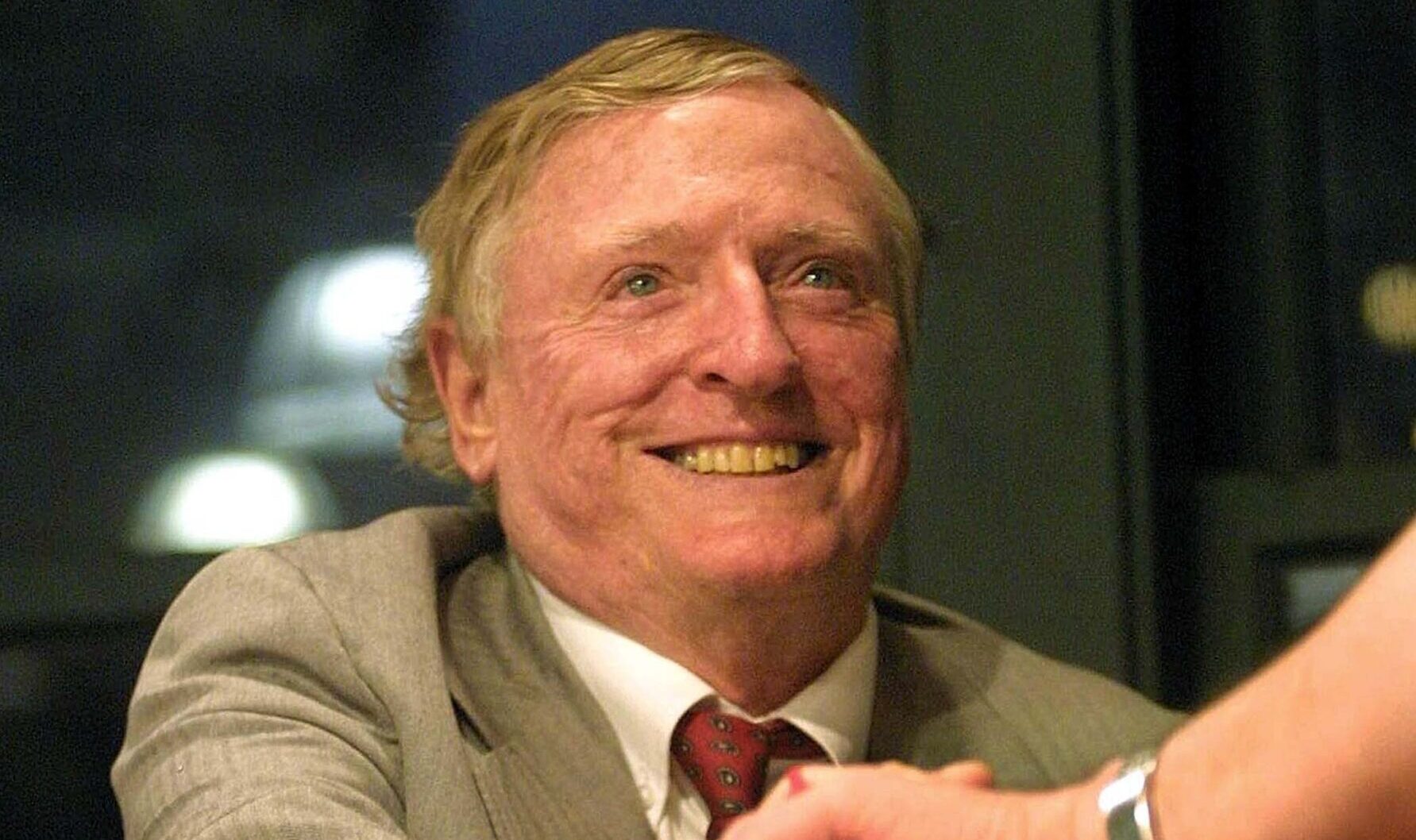
Buckley: The Life and the Revolution That Changed America, by Sam Tanenhaus. Penguin, 1,040 pages.
William F. Buckley Jr.’s reputation is in ruins. This is through no fault of Buckley himself, nor has it been brought about by the publication of this brick of a biography by Sam Tanenhaus. Rather, Buckley is suffering something like the fate that befell his early literary hero Albert Jay Nock, a philosophical anarchist who came to be remembered largely for his anti–New Deal politics. Nock died in 1945, and the Nock who was afterward needed by the young Buckley and others who sought to carry on the fight against the new order built by Franklin Roosevelt was simply a libertarian, the author of a book called Our Enemy, the State—never mind that that work wasn’t just anti-statist but an expression of radical “Georgist” economics. Nock was for a time cherished for how well he wrote, too, but ideology at length subsumed the memory of the author and man himself.
Buckley is now remembered, mostly by Americans over the age of 50, in connection with an ideology called conservatism. Younger Americans, even the conservatives, have at most heard his name but have read nothing he wrote. This is as true at his alma mater, the subject of his first book, God and Man at Yale, as it is on other campuses, though there is a Buckley Institute in New Haven that fights against the tide of undergraduate indifference. The trouble, in part, is that other institutions charged with keeping Buckley’s legacy alive are dedicated first of all to sustaining a dying ideology. Buckley, like Ronald Reagan, has since his death been appropriated by neoconservatives, NeverTrumpers, and outright liberals as a model housebroken conservative, an antithesis to what the right is today. This has made actual young right-wingers—people with temperaments not unlike that of a youthful William F. Buckley Jr.—write off this founding father of postwar conservatism as a harmless irrelevance at best, at worst a precursor of the threefold David: Brooks, Frum, and French.
Men and women who knew the real Buckley, meanwhile, want others to celebrate him as they do. But their very devotion to the friend they loved in his lifetime makes Buckley seem a figure only of nostalgia to those who have come of age since his zenith. The choice of Buckleys in the 21st century is a choice between the civil, clubbable, liberal-acceptable anti-Trump or the affable avatar of an age that feels as remote as the Coolidge administration. (If not moreso, for Tanenhaus’s Buckley supports Matthew Continetti’s conclusion in The Right that conservatism today bears a striking resemblance to its antiwar, anti-immigration, and protectionist configuration in the 1920s.)
Last year a PBS documentary on Buckley presented one other possibility: Buckley as a precursor to the Jan. 6, 2021 riot at the United States Capitol, a nice guy who started a nasty movement. Would that be the William F. Buckley Jr. of Tanenhaus’s book? Before its publication, old Friends of Bill worried: Tanenhaus is no man of the right, and he was finishing his work in the wake of the Trump years, Black Lives Matter, and all the polarizing experiences of the past decade. Buckley supported segregation in its time. Tanenhaus’s Buckley could easily have made race its focus.
That’s not what Tanenhaus has done, though Buckley’s racial politics are one of his themes, as they should be. Readers left of center may find the facts damning enough without embellishment from Tanenhaus. Readers on the right, however, may appreciate that the biographer has provided Buckley’s side of the story as well—or rather, the Buckleys’, plural, for Bill’s father, William F. Buckley Sr., was in this as in so many other things an influence on his son. The elder Buckley was, based on testimonials Tanenhaus relates from blacks who worked for him in South Carolina, a man of great personal charity that transcended racial lines, as well as the sponsor of a segregationist newspaper supporting, and supported by, the town’s White Citizens’ Council.
Tanenhaus tells a bigger, more complicated story than ideologues on any side will find pleasing. Yet he still doesn’t tell enough, and if his Buckley is not exactly what the left, the right, or dead center wants to read, it’s still overwhelmingly a story of Buckley’s political life and times. Buckley’s Catholic faith, his literary qualities as a novelist as well as nonfiction writer, his love of his wife, Pat, and imperfect relationship with their only son, Christopher, are touched on lightly or, in Christopher’s case, hardly at all. (If the book so much as mentions his birth, I missed it.) Tanenhaus’s Buckley is a supporting actor—perhaps one who steals the show, yet nonetheless always a moon orbiting a more consequential political figure, first Joseph McCarthy, then Barry Goldwater, later Richard Nixon, and finally Ronald Reagan, who as a newly elected president snubbed Buckley’s entreaties to appear in person at National Review’s 25th anniversary celebration in 1980.
Tanenhaus does credit Buckley with his decisive contributions to building the conservative movement—but the conservative movement itself, his narrative implies, is largely a sideshow to real politics. Dwight Eisenhower and Richard Nixon were the kind of Republicans Buckley and National Review set out to oppose in the 1950s, yet Eisenhower easily won a second term, and the right’s criticisms did nothing to stop Nixon from gaining the 1960 GOP presidential nomination and going on to win the White House twice in 1968 and 1972. McCarthy was more the creator of the conservative movement than its creation, the politician who blended anti-Communism with anti-establishment populism and thereby showed the right the way to its future. Tanenhaus credits Buckley’s brother-in-law, L. Brent Bozell Jr., with a more important role in helping Barry Goldwater and formulating Goldwater conservatism than Buckley himself played. Reagan was the politician who owed the most to Buckley. But in Tanenhaus’s telling, he owed much more to Jesse Helms, who supplied Reagan’s southern base for the primaries.
Buckley does take center stage during the Kennedy years, however, and in the immediate sequel to Goldwater’s 1964 defeat. After Nixon’s loss in 1960, Buckley and the Buckleyite right were finally free to flourish in opposition. Criticizing Eisenhower and Nixon, without being willing to reject them completely, had left National Review seeming like a wife trapped in the unhappiest of marriages. After Nixon lost in 1960, Buckley and company became merry widows, still young and nubile. Buckley even became, in terms of celebrity at least, the leader of the opposition, the spokesman for this radical new right which had not died with Joe McCarthy but had mounted a surprisingly strong push to nominate Goldwater in 1960 and started a youth movement, Young Americans for Freedom, in Buckley’s family home Sharon, Connecticut, that same year. Buckley’s thrice-weekly syndicated column—“On the Right,” launched in 1962—widened the reach of the right beyond the pages of small magazines intended for the eyes of the already faithful, such as National Review. In Tanenhaus’s account, the column would come to take up more of Buckley’s attention, and win more attention for him, than National Review did.
Buckley’s star only rose higher in the years after Kennedy’s assasination and Goldwater’s landslide loss to Lyndon Baines Johnson. In 1965, he ran for mayor of New York, nominated by a new party—the Conservative Party—he had helped found three years earlier. Buckley didn’t have to win that election: a strong showing was enough to prove that conservatism wasn’t finished after 1964, and could even mobilize new constituencies in the heart of liberal New York City. The higher profile Buckley earned for himself and his ideas led to another successful venture, the launch of his television program Firing Line in 1966.
Today “conservatism” as a brand is a multimedia enterprise, consisting of television channels, radio shows, podcasts and other new media, magazines and their websites, and a handful of newspapers. In the mid-to-late 1960s, William F. Buckley Jr. was the conservative media, thanks to National Review, “On the Right,” the steady stream of books he wrote (or compiled from the column and other sources), and Firing Line, as well as his guest appearances on other programs and his freelance writing for magazines like Esquire. Late in his book, Tanenhaus remarks somewhat disdainfully on Buckley’s embrace of Rush Limbaugh in the 1990s, but for all Limbaugh’s differences of style and substance with older man, he was truly an heir to the conservative media empire Buckley first carved out.
Buckley was not a policy mastermind, an election strategist, or a theorist of conservative ideas, but he was a brilliant entrepreneur of political communications, and Tanenhaus traces his entrepreneurial elan to his father. Buckley Sr.—Will Buckley—was a Texas-born oilman whose prospecting took his ventures to Mexico, South America, and beyond. He struck a lot of dry wells, but when he needed money, he issued more stock. He taught his son that when he saw something he thought worth buying, he should buy it, regardless of whether he had the money. Bill Buckley took this fatherly advice to heart, though it often put a strain on his finances (whenever he had a yen for a new yacht) and got him into trouble with business investments involving radio stations and drive-through movie theaters.
Bill inherited Will’s politics as well as his entrepreneurial ethos, and early on this made the young Buckley a staunch foreign-policy anti-interventionist. Will was a Catholic, a businessman with libertarian economic views and great admiration for Albert Jay Nock (whom he befriended, and with whom he shared a dim view of mass democracy), and an opponent of American entry into the Second World War. His son was outspoken in his antiwar views while attending the Millbrook School, where Bill’s roommate for a time was an English boy who took the other side in debates on the war. Alastair Horne became a friend for the rest of Bill’s life, one of the first of many instances of Bill separating political argument from personal relations. (Horne, of course, later became a great historian, the author of A Savage War of Peace. In my one brief email communication with him during the days of the Iraq War—which Buckley also opposed—Horne made clear he was no supporter and asked me whether he should call himself a paleoconservative.)
Tanenhaus largely refrains from caricaturing the American First Committee (which Buckley joined at 14) and its supporters. “The isolationist movement is remembered today for its anti-Semitic and pro-Nazi associations. Those strains were powerful, but not all-encompassing,” he writes, “particularly not among the combat-age young. They were more aware of the horrors of the Great Wars, its carnage and waste, the arrogance of empires.”
Even while serving in the Army during the war, Bill Buckley found occasions to express a degree of dissent. Tanenhaus quotes one letter from Buckley to his parents in which he relates an experience teaching soldiers at Fort Sam Houston: “If they keep on giving me groups of men for orientation and current affairs talks you will see the polls rise steadily for the isolationist faction. … One of these days, after an orientation, I will find about six MP’s who will politely but firmly escort me to the Adjutant General’s Department which will prefer charges for sedition.”
Yet by the time Buckley founded National Review in 1955, he had become an ardent Cold Warrior. He’d served a stint in the CIA, it’s true (and his NR colleague Frank Meyer believed that Buckley ran the magazine as an Agency operation). But Tanenhaus notes Buckley’s trajectory was not so different from that of many other non-interventionists who became anti-Communist hawks. At Yale, which he attended after leaving the Army, Buckley was influenced by one of his professors, Willmoore Kendall, who was not only a former red fellow-traveler-turned-anti-Communist but also a majoritarian critic of civil liberties, including freedoms exercised in antiwar dissent. Buckley, as Tanenhaus notes, had championed such liberties when they were exercised by the antiwar right. But now they were used by leftist critics of American foreign policy such as Henry Wallace, who united in his 1948 campaign for president on the Progressive Party ticket two traits that Buckley detested: softness toward Communism abroad and an inclination toward socialism—or at least ever-newer New Deals—at home. Kendall supplied intellectual ammunition against Wallace, firepower he, Buckley, and Brent Bozell would later deploy in defense of McCarthy.
Kendall also introduced Buckley to James Burnham, first to his work, then to the man himself, who recommended Buckley for the CIA and later became one of his chief collaborators in establishing and running National Review. Although Burnham’s significance as a mentor to Buckley is well-attested—with Buckley, after Will Buckley’s death in 1958, calling Burnham the closest thing he now had to a father—Tanenhaus does not explore their relationship in depth. Indeed, Buckley’s friends and colleagues at National Review are a surprisingly small part of this big book’s narrative, with Whittaker Chambers looming rather large as an exception. Perhaps that’s understandable, given Tanenhaus’s background with Chambers, about whom he wrote a biography; Chambers was indeed a lodestar for Buckley—though the younger man could never quite share his enthusiasm for Nixon.
Tanenhaus excels in many of the early chapters, revealing more detail about Buckley’s early life and views than any previous biographer. There are other books and biographies to which one might turn for a fuller picture of National Review. But Tanenhaus takes on so much that even with nearly a thousand pages of text, his Buckley feels incomplete. Most surprising of all, Tanenhaus’s main narrative comes to an end around 1980, with the last hundred pages or so covering more than two and a half decades of Buckley’s working life (which continued up to the day he died in 2008). Those final decades included a sudden turn to writing semi-autobiographical novels in the 1990s and early 2000s, before Buckley published three slim final volumes of semi-autobiographical nonfiction, short books on the fall of the Berlin Wall, Barry Goldwater, and Ronald Reagan. Unlike most of Buckley’s books before this final phase, these were not collections of previously published material. They deserve a biographer’s attention, even if that biographer is not Sam Tanenhaus.
The book is a light read despite its heft, with short chapters whose breeziness belies the hard work that certainly went into composing them. Buckley reads as a highly accessible history of American conservative politics in the mid-to-late 20th century, and Buckley himself is a thread running through that story. But there is much about the man and his work on its own terms that remains to be told. Tanenhaus couldn’t plausibly cover everything, and Buckley shows signs, to this editor’s eye, of being published now because Random House insisted on it, not because Tanenhaus had written his last word. But a publisher in the 21st century isn’t going to bring out a two-volume Buckley biography, which is what Tanenhaus might have really wanted to write; with 2025 marking Buckley’s 100th birthday, a publisher could hardly be blamed for insisting the book come out now if it’s ever going to come out. The public’s memory of Buckley and his contributions already dwindles.
Tanenhaus’s Buckley won’t arrest that decay, impressive though the book is. It can be maddening too, to be sure. Why, for example, does a chapter on Buckley’s efforts to free a convicted killer, Edgar Smith, first emphasize WFB’s penchant for “references to himself and other men as Cinderellas and princesses and Hollywood goddesses” before concluding “Buckley’s devotion to Smith, the intimacy of his feeling, verged on infatuation”? Tanenhaus otherwise rarely psychologizes Buckley, and nothing in what he relates about Buckley’s involvement with Smith suggests sexual attraction—though Tanenhaus makes a point of noting how attractive he was to women. Earlier chapters on Buckley’s sparring with Gore Vidal on television and in print—including in an infamous exchange on live TV during the 1968 Democratic National Convention (involving the dueling epithets “crypto-Nazi” and “goddamn queer”)—and later chapters on Buckley’s (and his wife’s) friendships with gay men and reaction to the AIDS epidemic also tease questions about Buckley’s sexuality. Yet Tanenhaus, whose biography of Chambers reported the previously little-known fact of his bisexual activities, supplies no evidence or testimony that Buckley was anything but heterosexual. There’s only insinuation.
Subscribe Today
Get daily emails in your inbox
A biographer who worked on a book as long as Tanenhaus has worked on Buckley—he was picked by his subject to be his official biographer shortly after the Chambers book came out—might be forgiven, or at any rate indulged, for getting a few odd ideas lodged in his head over more than a quarter-century. But with so much to cover, and so much omitted, the space devoted to Edgar Smith and to queer speculation is excessive.
Buckley admirers will find much else to annoy them, too, including Tanenhaus’s unconcealed outrage at his subject’s blurring the lines between journalism and PR, especially in his defense of Nixon (and Buckley’s former CIA handler, E. Howard Hunt) early in the Watergate scandal. But this was part of Buckley’s entrepreneurial verve—he didn’t let the established rules stop him. His friends will take exception to Tanenahaus’s lengthy critical unraveling of Buckley’s business ventures, too. Whether Tanenhaus has overdrawn the connections between Will Buckley’s oil prospecting and financial schemes and his son Bill’s genius and lapses alike is something future biographers will have to examine.
But Buckley is not a demolition of its subject, and Tanenhaus at times displays a remarkable degree of sympathy for figures such as the doomed but noble Brent Bozell: brilliant, alcoholic, manic-depressive, almost saintly in his charitable works at the end of his life. The biographer concludes with a lyrical passage about Buckley himself, paying tribute in full to “the imagination and generosity, the kindness and warmth, that Bill Buckley demonstrated time and again…” His reputation is in need of recovery, and there is the place to start.


